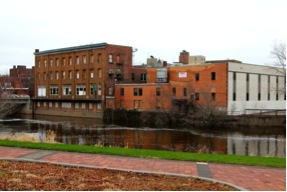Proposed state budget includes money for Confluence
$15 million proposed, but project still has hurdles left

Photo by File Photo
February 4, 2015
Gov. Scott Walker’s budget proposal, unveiled Tuesday, dog-ears $15 million for the Confluence Project, a proposed arts center in downtown Eau Claire.
Walker’s proposed funding will have to clear some hurdles before it’s finalized, but Confluence Project supporters hope for a final number soon to start designing the building for construction, Mike Rindo, assistant chancellor for facilities and university relations, said.
Rindo said they were grateful for the $15 million from the 2015-2017 biennial state budget, even if planners aimed for $25 million.
Rindo said even if the designs come out different than first planned, the next draft can still emphasize the goals of the project.
“There may be some changes in scope,” he said. “It’s our intent that the size of the theaters, the quality of the construction, the experience of the artists who are performing and the patrons who are partaking in the performances … we’re not going compromise that.”
Rindo said because the state’s contribution isn’t final, he couldn’t speculate on what parts of the proposed building would take priority.
He said there’s always the possibility funding will be less than hoped for. Similarly, Confluence planners received $3.5 million from Eau Claire County when the planners hoped for $5 million.
The building also received $5 million from the city of Eau Claire, $3 million in tax credits and is trying for $12 million from donations, Kathy Mitchell, Eau Claire City Council vice president, said.
Mitchell said although the city is not directly involved with planning, two city council members sit on the design committee.
“We don’t really have to talk about cutting back at this point,” Mitchell said, “because we haven’t made the decisions to start with.”
Mitchell said they will start planning once they have a better idea of the funding total.
She recommends people follow the state budget as it makes its way first through the Joint Finance Committee, the Legislature and then back to the governor.
“We’re going to have to work hard with our Legislators to keep that money in there,” Mitchell said. “Just because the governor put it in, it’s not a done deal.”
